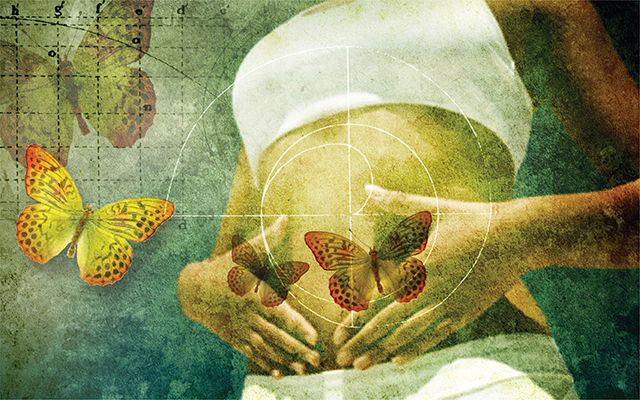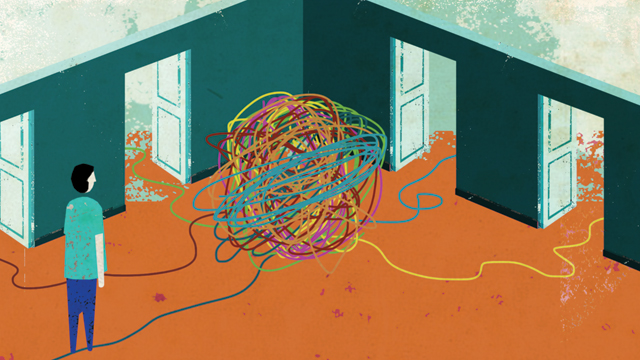Gary Stone had been looking forward to attending his college fraternity reunion for months. Gregarious almost to a fault, he loves spending time with people. So when the night of the event arrived, Gary was excited to go.
Gary’s wife, Jill, wanted to meet his chums, but the extra hours she spent prepping for a legal deposition that week, coupled with attending their daughter’s two-day swim meet, had worn her out. All she wanted to do was eat dinner, curl up with her cat and a good book, and turn in early.
When she told Gary she’d rather skip the party, he got angry; he felt Jill was being selfish. Jill felt hurt that Gary wasn’t making her needs a priority — he seemed to care more about seeing his college friends than considering her feelings. They were at a common impasse, one we’ve all faced at different points in our lives.
Conflicts tend to arise when two people — whether partners, coworkers, family, or friends — have different motivations, needs, and desires. To resolve these sorts of disagreements, it’s helpful to understand what’s driving our behavior. That’s why many psychologists and life coaches recommend the Enneagram, a personality-typing system that draws on several wisdom traditions.
The Enneagram describes nine personality types that influence the way people perceive and respond to human interactions. It’s especially useful for understanding what we might otherwise view as the random behavior of others — while also demystifying our own choices and reactions. (See “Peace Through Personality”.)
Biology also shapes who we are and how we act. To that end, Enneagram experts have identified three key biological drives, or “instincts,” that influence our feelings and actions: self-preservation, sexual, and social. While one instinct tends to dominate in each of us, we’re endowed with all three in varying measures.
Imagine a three-layered cake — called the “instinctual stack” by Enneagram teachers — with your dominant instinct on top, your less-developed instinct in the middle, and your least-developed on the bottom. Your particular stack develops in childhood and remains mostly stable throughout your life, though it can shift during times of dramatic change.
Identifying your dominant instinct can help you better understand the people you care about — and even transform your relationships. Read on for help figuring out yours.
A Closer Look at the Three Instincts
Before you can effectively harness the power of all three instincts, experts say, it’s helpful to first understand their qualities. From there, you can determine which one you tend to favor. (To identify your dominant instinct, take the online assessment at www.enneagraminstitute.com.)
Self-Preservation
Focused on enhancing and protecting personal safety, security, and comfort.
Priorities: Physical well-being, financial security, mental health
Characteristics: A healthy self-preservation type takes care of practical necessities like paying bills, maintaining the home, and investing in the future. This type tends to be self-sufficient, disciplined, and devoted to self-improvement. “It’s through our self-preservation instinct that we find a more respectful relationship with our bodies,” says Diana Redmond, a Santa Fe–based life coach and certified Enneagram teacher.
Weaknesses: An unbalanced self-preservation instinct can lead to a preoccupation with financial and other forms of security and an obsessive relationship with diet and exercise.
Sexual
Focused on creating and maintaining a powerful sense of “sizzle” through intense, intimate interactions and experiences.
Priorities: Intimacy, connection, excitement
Characteristics: Healthy sexual types will often have deep passions, and they aren’t afraid to try new things. The instinct drives them to create truly intimate connections with those they love and to connect with love itself, says Redmond. These types are more in search of chemistry than the sexual act, though they do seek an especially powerful connection with their intimate partners.
Weaknesses: Sexual types practice an exploratory approach to life that can lead to a lack of focus, as well as neediness and promiscuity.
Social
Focused on creating and maintaining relationships to build a sense of personal value, accomplishment, and community.
Priorities: Interpersonal relationships, group participation
Characteristics: Healthy social types typically maintain many friendships, feel a strong sense of social responsibility, and work to protect the group. They have a keen understanding of group dynamics and its emotional currents, and they’re highly adaptive. Redmond says the social instinct drives us to connect with others in ways that help us grow.
Weaknesses: Social types may develop an antisocial “us against them” attitude in an effort to determine who’s on their side. They can maintain a sense of belonging at all costs. Since they thrive on community spirit, they may also overadapt to a group and forget to think for themselves.
Friend or Foe?
Our dominant instinct can guide us toward feeling at ease in the world, but it is usually overdeveloped. This can create blind spots in our perception when we’re under stress. It’s our default instinct for taking care of our perceived needs, but it can also lead us to overestimate them, says Diana Redmond, a Santa Fe–based life coach and certified Enneagram teacher. If self-preservation is your dominant instinct, for instance, losing your job could make you feel like you’ll never have enough food, and you may begin hoarding it.
It’s not surprising we often act unconsciously from our dominant drive when conflicts arise in personal relationships where we often feel vulnerable. People who share the same dominant instinct are more likely to resolve differences because their priorities are similar. But people whose dominant instinct is our own least-developed one often annoy us because their priorities seem to make no sense.
Curt Micka, a Minneapolis-based mediator and coach who uses the Enneagram in his practice, has found that differences in dominant instincts can be a “significant cause of conflict between people, whether at work or home.”
If one person in an intimate relationship is dominant in the sexual instinct, for example, and the other is dominant in self-preservation, the former may seek a deep connection very quickly while the latter may prefer to keep strict personal boundaries. This can create friction and frustration, Micka says.
But it doesn’t have to if we’re willing to develop greater self-awareness and compassion for ourselves and others, and “consciously choose the best way to act in a given situation,” says Redmond.
If gregarious Gary and his exhausted wife, Jill, were aware of each other’s dominant instinct, they could simply agree on a time to head home from the party. Then the social type (Gary) would get to spend time with his old buddies, and the self-preservation type (Jill) would be assured of getting enough downtime.
Strike a Balance
Though we all have natural inclinations that tend to govern our behavior, we also have the opportunity to develop each instinct more fully. This can help us gain a more thorough understanding of ourselves, maximize our strengths, and connect with others more effectively.
Micka offers the following suggestions for strengthening the instinct that is your least developed:
- If you tend to neglect your self-preservation instinct, try paying more attention to your physical health. Set aside more time for cooking, create a workout schedule, spend some time on financial planning, or invest some resources in your home environment.
- If your sexual instinct is less developed, try challenging your boundaries by seeking out people and activities that allow you to step outside of your comfort zone and experience more pleasure, fun, and intensity.
- If you’re not normally inclined to follow your social instinct, get more involved in a group or say yes to more social events. Seek out opportunities to connect with friends, colleagues, and neighbors.
Knowing your dominant instinct type helps you better understand what motivates you and how you can be most comfortable in the world. Cultivating your less-dominant instincts can help you become more balanced and whole. After all, life is about more than just survival — and when we understand our instinctive selves, we can enjoy life more fully.
To read more about the Enneagram Types, see “Inside the Enneagram.”
Illustration by Serge Seidlitz
A version of this article titled “Basic Instincts” first appeared in the July/August 2016 issue of Experience Life magazine. Click here to subscribe.




This Post Has 0 Comments